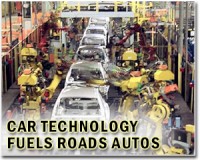 |
Chicago (AFP) March 15, 2011 Some popular Japanese cars could be in short supply in the United States as Japanese automakers tailed back production in both countries in the wake of Friday's devastating earthquake, analysts said Tuesday. Supplies especially of hybrid and small, fuel-efficient cars could tighten with Japan's shipping infrastructure hobbled and electric power to factories reduced after the earthquake and subsequent tsunami knocked out crucial nuclear power stations. Mounting worries Tuesday of radiation spreading from the nuclear plants could also further expand evacuations in Japan, forcing producers to shut down longer than a few days. Meanwhile dependence on Japan-sourced parts was also forcing production slowdowns in US plants. Toyota said Tuesday it had stopped building cars on overtime in the US. "It didn't make any sense to build vehicles on overtime if we were not sure we would have enough parts," said Toyota spokesman Javier Moreno. "We're not sure how many parts they can send us," he said. America's big carmakers said they, too, were not immune to Japan's parts supply chain. "It's going to have an effect on all manufacturers," said General Motors spokesman Chris Perry, adding the impact could extend to GM's operations in China. In Japan, all of the large auto builders and many components suppliers said they were shutting down production for several days this week. Bridgette Gollinger, spokeswoman for Denso, one of the largest Japanese suppliers, said its factories weren't damaged. But deliveries from its own suppliers are uncertain, creating the possibility of shortage of key components," she said. "Japan's earthquake and its effects have shut down vehicle production at all major automakers," said Efraim Levy of Standard & Poors. "Some plants are affected by parts supplier issues, employee considerations and/or damage to export ports," he said. As a result, cars in high demand in the United States, like Nissan's all-electric Leaf, and its Quest family van, could be hit if production is out for more than a few weeks, according to Edmunds.com. The auto industry specialist said Leafs spend an average of just seven days on US dealers' lots, and Quests just 10 days -- testament to the need for Nissan to keep their factories on line for these models. Nissan spokesman Brian Brockman said a shipment of 600 brand new Leafs set sail for the US just prior to the earthquake. But a key pier that Nissan uses for exports was then swamped by the tsunami and more than 2,300 vehicles were destroyed. "Japanese hybrids and small cars, with few exceptions, are produced in Japanese plants. With rising gas prices in the US, demand for fuel-efficient vehicles will likely increase and automakers who have supply will reap the benefits," said analyst Jessica Caldwell of Edmunds.com. Toyota USA spokesman Mike Michels said it was too early to speculate about the impact on sales of the Prius, which depends on an array of sophisticated parts made in Japan, and the Scion models, which comes from a plant in quake zone. "We are now conducting a detailed survey of each plant to determine the extent of any damage. We are also currently assessing the situation at our suppliers, dealers and the impact on North American import vehicles," Toyota said. Ford said it was monitoring the situation surrounding battery cells used in the company's hybrid vehicles such as the Ford Escape. Sanyo, a Japanese electronics company, makes the cells for Ford. Supplies of semiconductors now considered essential in cars were also in question, according to Deutsche Bank auto analyst Rod Lache. The car chips were already in tight supply prior to the earthquake Friday, and Japan supplies 22 percent of them, he noted. The overall damage to Japan's crucial car industry will not be high, analysts said, unless the shutdowns in car and part plants go on into April. They often have 50-60 days of dealer inventory in the United States, noted JP Morgan research. There is "no near-term impact, but risk grows beyond two weeks," JP Morgan said. In the longer run, the industry will almost certainly get government support to rebuild. "As was the case for key parts suppliers following the earthquake in Niigata Prefecture a few years ago, we expect the entire Japanese auto industry to receive reconstruction assistance and thus anticipate no real lingering damage to production capabilities over the longer term," JP Morgan said.
Share This Article With Planet Earth
Related Links Car Technology at SpaceMart.com
 Buffett-backed China carmaker BYD sees profit slip
Buffett-backed China carmaker BYD sees profit slipBeijing (AFP) March 14, 2011 Chinese carmaker BYD, backed by US billionaire Warren Buffett, said net profit fell 33.5 percent year on year in 2010 due to intense competition and rising distribution costs. The company - in which Buffett's Berkshire Hathaway holds a nearly 10 percent stake - posted a net profit of 2.52 billion yuan ($384 million) last year, it said in a statement. That compared with 3.79 billion yua ... read more |
|
| The content herein, unless otherwise known to be public domain, are Copyright 1995-2010 - SpaceDaily. AFP and UPI Wire Stories are copyright Agence France-Presse and United Press International. ESA Portal Reports are copyright European Space Agency. All NASA sourced material is public domain. Additional copyrights may apply in whole or part to other bona fide parties. Advertising does not imply endorsement,agreement or approval of any opinions, statements or information provided by SpaceDaily on any Web page published or hosted by SpaceDaily. Privacy Statement |